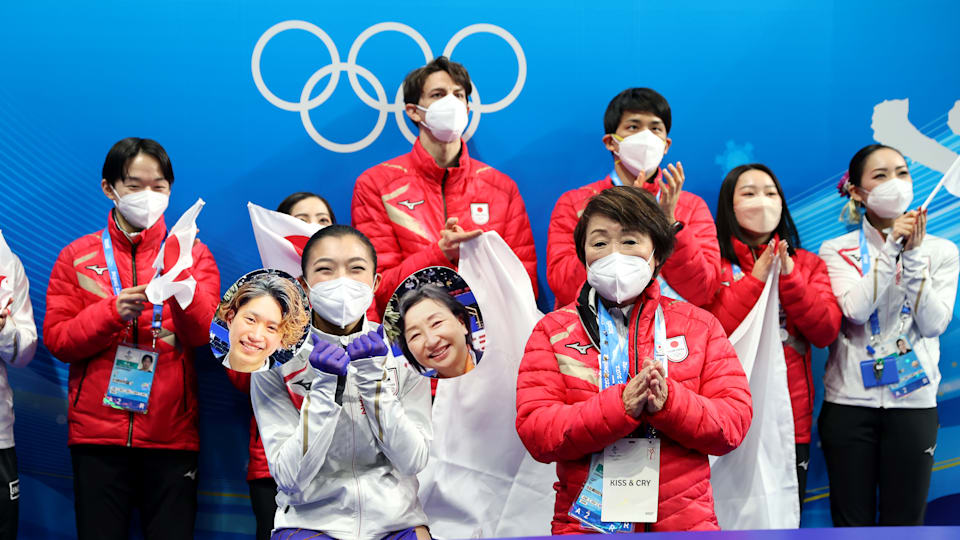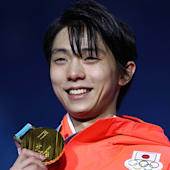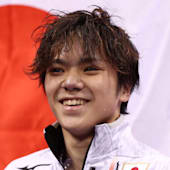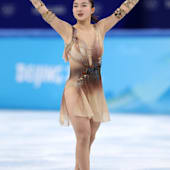Figure skating: In post-Hanyu Yuzuru competitive era, Japan goes from strength to strength (to strength)
The two-time Olympic champion Hanyu announced he would transition to show skating last year after his third Games at Beijing 2022, but Japanese fans have plenty to cheer about in the sport - now and in the future.

As two-time Olympic champion Hanyu Yuzuru stepped away from competiton and into performing in (and producing) shows last year, the question lingered: What comes next for Japanese figure skating?
The answer - now and for the foreseeable future - is: Seemingly only more success.
As the sport descends on Saitama, Japan, for the 2023 ISU World Championships next week (22-26 March), Hanyu's former teammates and Olympic medallists Uno Shoma and Sakamoto Kaori are the reigning world champions in singles. Team Japan, in fact, is in the race for gold in three of the four disciplines in Saitama, with pairs team Miura Riku and Kihara Ryuichi arriving as Grand Prix Final and Four Continents winners.
The Saitama Super Arena is sure to be rocking.
Worlds returns to Saitama, which sits on the outskirts of Tokyo, for a third time in a decade. In 2019 it was only Hanyu who landed on the podium for the host nation, after he and Asada Mao both skated away from the same venue as world champs in 2014.
Next week could be much the same, with Uno leading the men's favourites and Sakamoto joined by teammates Mihara Mai (as well as triple Axel-jumping Watanabe Rinka) as favourites in the women's. Mihara, in fact, swept the first half of the season with Grand Prix wins at her two assignments and then a thrilling victory at the Grand Prix Final, where Uno and Miura/Kihara also triumphed.
It's a strength-to-strength-to-strength scenario for a longtime skating powerhouse nation, dating back some 30 years with success largely in the singles fields.
Team Japan at Worlds: A legacy of success continued
While Russia remains on the sidelines of competition due to International Skating Union (ISU) guidelines, Japan has nonetheless seen a gradual strengthening of its global performance over the years.
Ito Midori won the nation its first-ever Olympic medal in the sport at Albertville 1992 (after claiming the world title in 1989), and 14 years later Arakawa Shizuka was the surprise Olympic champion in women's singles at Torino 2006.
That marked an upward trend over the last nearly 20 years, however: Takahashi Daisuke was the first Japanese man to land on the podium at Vancouver 2010 (the world champ in singles in 2010; too, he's now transitioned to ice dance), as the likes of Hanyu, Asada, Uno, and Sakamoto grew into world - and in Hanyu's case, Olympic - champions.
While the Olympic Games are the pinnacle of the sport, there have been many consistent forces on the singles scene over the last three decades, including Sato Yuka, the 1994 world champ, two-time world medallist Suguri Fumie, 2011 world champ Ando Miki, as well as Honda Takeshi, Kozuka Takahiko, and many others.
Takahashi's 2010 world title - won just weeks after his bronze at Vancouver - marked Japan's first world crown in men's singles.
The impact of Hanyu - who captured Winter Olympic gold at both Sochi 2014 and PyeongChang 2018 - cannot be under-valued in this overall picture: He went from skating to sporting to cultural icon in his home nation, loved by millions - and with a generation looking up to him.
While teenager Kagiyama Yuma, a Youth Olympic Games champion at Lausanne 2020 and the reigning Olympic bronze and world silver medallist, has been hampered this season by an injury, he has served as clear representation that the Hanyu impact has been felt by the next generation.
It's an aim of the shows that Hanyu has performed since stepping away from competition: A chance to grow the sport outside the lines of sanctioned events; a place where he feels he can express himself differently.
That expression has been reflected in the upcoming generation, as well.
What's next: Burgeoning juniors - and strength in pairs, dance
That was clearly on display at World Juniors in early March in Calgary, Canada, with Japan's Miura Kao and Shimada Mao capturing the singles titles.
Shimada is the first world champ at the junior level for the Japanese women since Honda Marin won in 2016, while Miura's win was a first for a Japanese male in juniors since Uno triumphed in 2015.
Miura has already found success at the senior men's level: This season, the 17-year-old captured silver at both Skate America and Skate Canada International before winning the title at Four Continents. But competition remains so fervent domestically in singles that he placed sixth at nationals in December, missing out on a coveted Worlds spot.
While singles skating has been the most popular and most successful force within the national program over the last three decades, the success of Miura/Kihara - who could add a world title in front of home fans to their legacy this next week - has opened up new avenues.
"I’m glad we are achieving", Kihara told Olympics.com earlier this season. "But we owe this to our predecessors who carved out the path we’re on right now. So it’s our turn, to keep working hard and keep this going for future generations. Our work is cut out.”
While pairs remains the "last" of the four disciplines in Japanese skating, ice dance has also received a buoy by the competition between Takahashi and his partner Muramoto Kana (who will skate at Worlds) versus four-time national champions Komatsubara Misato and Koleto Tim.
Nothing showcased that development more than the team's performance at Beijing 2022, where Japan finished on the podium in the team event, a true testament to an overall development.
Now, over 30 years after Ito's first Olympic medal - with Hanyu on the show circuit and the sport experiencing new levels of exposure in the country - what will come next for Japanese figure skating?
It's something fans can only wait with excitement to find out.








